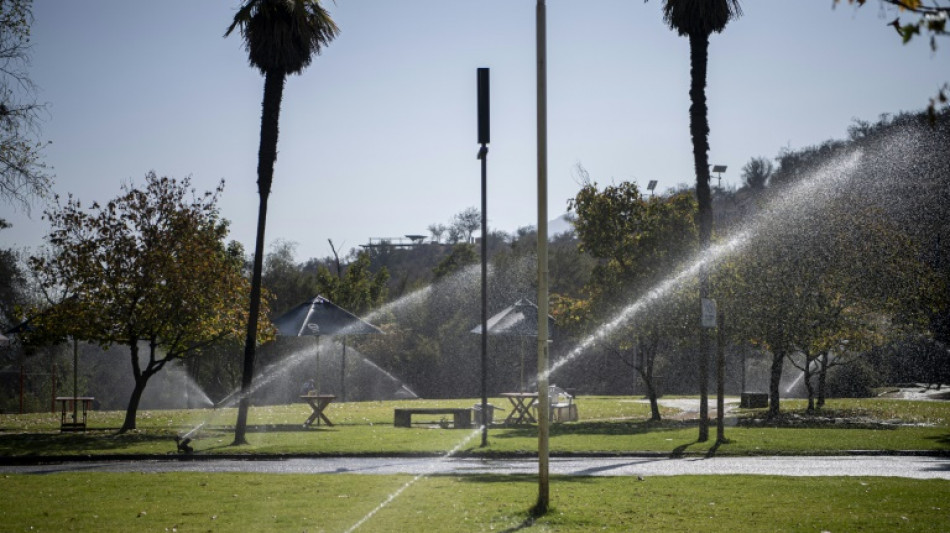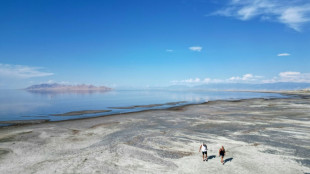
-
 Weather may delay launch of mission to study deflected asteroid
Weather may delay launch of mission to study deflected asteroid
-
China to flesh out economic stimulus plans after bumper rally

-
 Artist Marina Abramovic hopes first China show offers tech respite
Artist Marina Abramovic hopes first China show offers tech respite
-
Asian markets track Wall St rally on US jobs data

-
 Pakistan 122-1 at lunch in first England Test
Pakistan 122-1 at lunch in first England Test
-
Kazakhs approve plan for first nuclear power plant

-
 World marks anniversary of Oct. 7 attack on Israel
World marks anniversary of Oct. 7 attack on Israel
-
'Second family': tennis stars hunt winning formula with new coaches

-
 Philippines, South Korea agree to deepen maritime cooperation
Philippines, South Korea agree to deepen maritime cooperation
-
Mexico mayor murdered days after taking office

-
 Sardinia's sheep farmers battle bluetongue as climate warms
Sardinia's sheep farmers battle bluetongue as climate warms
-
Japan govt admits doctoring 'untidy' cabinet photo

-
 Israel marks first anniversary of Hamas's October 7 attack
Israel marks first anniversary of Hamas's October 7 attack
-
Darvish tames Ohtani as Padres thrash Dodgers

-
 Asian markets track Wall St rally on jobs data
Asian markets track Wall St rally on jobs data
-
Family affair as LeBron, Bronny James make Lakers bow

-
 Cancer, cardiovascular drugs tipped for Nobel as prize week opens
Cancer, cardiovascular drugs tipped for Nobel as prize week opens
-
As Great Salt Lake dries, Utah Republicans pardon Trump climate skepticism

-
 Amazon activist warns of 'critical situation' ahead of UN forum
Amazon activist warns of 'critical situation' ahead of UN forum
-
Mourners pay tribute to latest victims of deadly Channel crossing

-
 Tunisia incumbent Saied set to win presidential vote: exit polls
Tunisia incumbent Saied set to win presidential vote: exit polls
-
Phillies win thriller to level Mets series

-
 Yu bags first PGA Tour win with playoff win
Yu bags first PGA Tour win with playoff win
-
PSG held by Nice to leave Monaco clear at top of Ligue 1

-
 AC Milan fall at Fiorentina after De Gea's penalty heroics
AC Milan fall at Fiorentina after De Gea's penalty heroics
-
Lewandowski treble for leaders Barca as Atletico held

-
 Fresh Israeli strikes hit south Beirut
Fresh Israeli strikes hit south Beirut
-
Sucic stunner earns Real Sociedad draw against Atletico

-
 PSG draw with Nice, fail to reclaim top spot in Ligue 1
PSG draw with Nice, fail to reclaim top spot in Ligue 1
-
Gudmundsson downs AC Milan after De Gea's penalty heroics for Fiorentina

-
 'Yes' vote prevails in Kazakhstan nuclear plant vote: TV
'Yes' vote prevails in Kazakhstan nuclear plant vote: TV
-
'Difficult day': Oct 7 commemorations begin with festival memorial

-
 Commemorations begin for anniversary of attack on Israel
Commemorations begin for anniversary of attack on Israel
-
Lewandowski hat-trick powers Liga leaders Barca to Alaves victory

-
 'Nothing gets in way of team,' says Celtics' MVP hopeful Tatum
'Nothing gets in way of team,' says Celtics' MVP hopeful Tatum
-
India maintain Pakistan stranglehold as Windies cruise at Women's T20 World Cup

-
 'We will win!': Mozambique's ruling party confident at final vote rally
'We will win!': Mozambique's ruling party confident at final vote rally
-
Tunisia voting ends as Saied eyes re-election with critics behind bars

-
 Florida braces for Milton, FEMA head slams 'dangerous' Helene misinformation
Florida braces for Milton, FEMA head slams 'dangerous' Helene misinformation
-
Postecoglou slams 'unacceptable' Spurs after 'terrible' loss at Brighton

-
 Marmoush double denies Bayern outright Bundesliga top spot
Marmoush double denies Bayern outright Bundesliga top spot
-
Rallies worldwide call for Gaza, Lebanon ceasefire

-
 Maresca hails Chelsea's 'fighting' spirit after draw with 10-man Forest
Maresca hails Chelsea's 'fighting' spirit after draw with 10-man Forest
-
New 'Joker' film, a dark musical, tops N.America box office

-
 Man Utd stalemate keeps Ten Hag in danger, Spurs rocked by Brighton
Man Utd stalemate keeps Ten Hag in danger, Spurs rocked by Brighton
-
Drowned by hurricane, remote N.Carolina towns now struggle for water

-
 Vikings hold off Jets in London to stay unbeaten
Vikings hold off Jets in London to stay unbeaten
-
Ahead of attack anniversary, Netanyahu says: 'We will win'

-
 West Indies cruise to T20 World Cup win over Scotland
West Indies cruise to T20 World Cup win over Scotland
-
Arshdeep, Chakravarthy help India hammer Bangladesh in T20 opener


Under shadow of drought, Santiago ditches exotic plants
With drought casting a constant shadow over Santiago's 7.1 million residents, there has been a recent rush to replace thirsty, exotic plants with hardier, native ones in the hopes of staving off water rationing.
One of Latin America's most urbanized cities has experienced more than a decade of drought, and managing water access for its fast-growing population is becoming increasingly difficult.
Last year saw the driest winter -- the rainy season in Chile -- this century, with 71 percent lower rainfall for Santiago than usual, according to the national meteorological office.
Predictions are equally dire for the southern-hemisphere winter about to start with the Mapocho River at 57 percent of capacity, the Maipo River at 61 percent and the El Yeso reservoir at just over two-thirds full.
City authorities are bracing for tough times ahead.
"We can’t make it rain. That is out of our hands, but we can prepare for... an extreme situation," said Claudio Orrego, governor of Santiago.
Last week, the municipal government announced a four-step crisis plan that starts with encouraging voluntary water conservation but could end in a "Red Alert" phase of rationing.
If the water runs out, cuts will be rolled out to one sector of the city at a time, for a maximum of 24 hours each, under the plan.
It could affect some 142,000 households supplied by the Mapocho River, which bypasses Santiago from east to west, and another 1.5 million that rely on the Maipo River to the south.
- 100,000 trees -
Every day, agricultural engineer Pablo Lacalle -- head of water resources at the Santiago Metropolitan Park (Parquemet) -- guages the level of the Mapocho River.
Last year, the water level fell by more than half, according to official data.
"We have to plan... to know how much irrigation capacity we will have," Lacalle told AFP with a concerned look.
"We have a deficit of about 87 percent of water in the park compared to previous years... Fifteen years ago the park had enough water to irrigate everything."
Faced with the new reality, the park is rolling out a drought-busting re-planting plan.
"We have replaced exotic forest with native forest," with 100,000 trees replanted in three years on the park's northern slope, Parquemet director Eduardo Villalobos said.
Last year, pasture in the park was reduced by 50,000 square meters and replaced with endemic plants.
- Every drop 'precious' -
In the city itself, some are starting to take aim at green grass.
Urban architect Joaquin Cerda in 2021 launched a movement against "European-style" grass-lined sidewalks.
His project, "Vereda Nativa" (Native Sidewalk), has so far replaced some 150 square meters (1,600 square feet) of grass in the neighborhood of Pedro de Valdivia Norte with 25 native plant species.
These were more adept, he said, to the climate of Santiago, "to prolonged drought and to live a long time without water," he told AFP.
Now, "we water here once a week for half-an-hour using drip irrigation," said Cerda, reducing water consumption to less than a tenth of what it was before.
"Every drop of water is very precious."
According to the World Bank, annual precipitation in Chile's coastal regions has decreased by 15 to 30 percent in the last century, leading to multiple periods of severe drought.
Climate change would likely change the frequency and magnitude of hazards such as wildfires and droughts, with risks for economic growth and public health, it says.
Access to water has become an increasingly contentious point in Chile.
Legally, water is a resource for public use, but the government has granted almost all exploitation rights to the private sector.
Industry accounts for about 20 percent of consumption and agriculture another 70 percent, with avocado -- a major Chilean export -- a particularly thirsty crop.
This all posed little problem in times of abundance, but drought brought a furious reaction in 2020 when some communities started running out of water.
Protesters occupied a well managed by a copper mining company, demanding it be used to provide water to communities instead.
The Constitutional Convention drafting a proposed new founding law for Chile on Monday approved an article stating that water is an "inalienable public good."
F.Schneider--AMWN